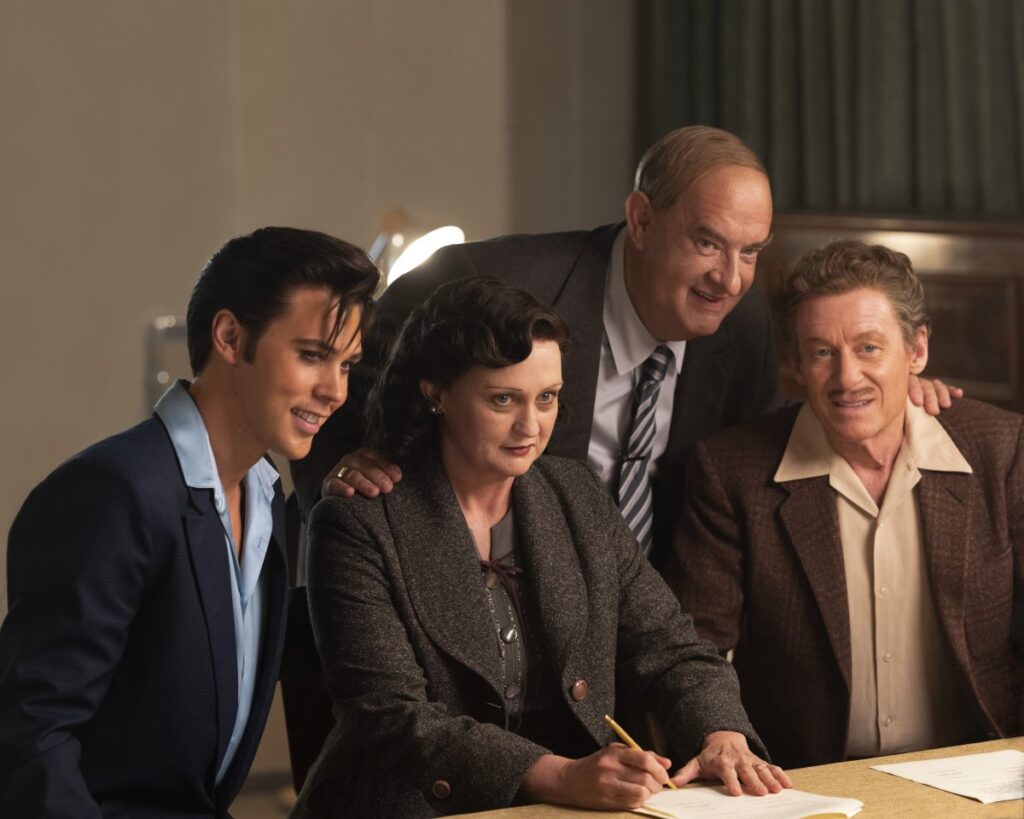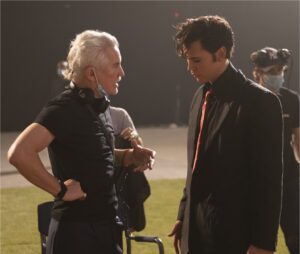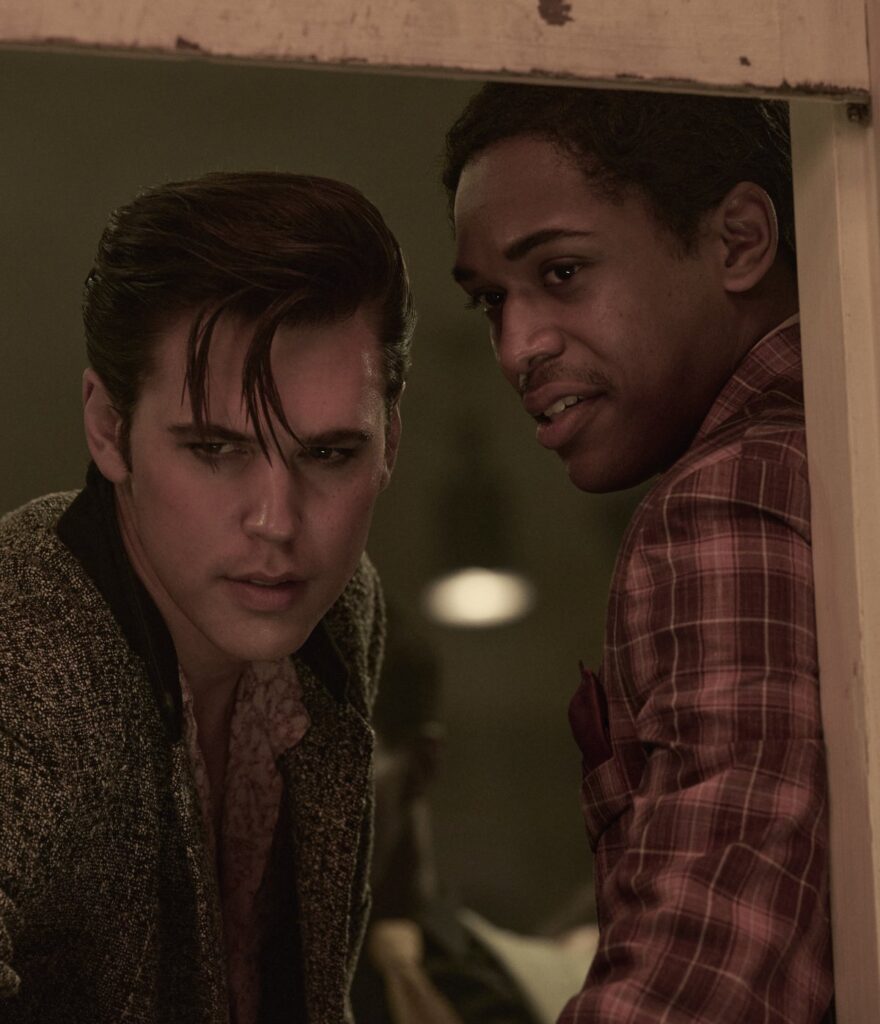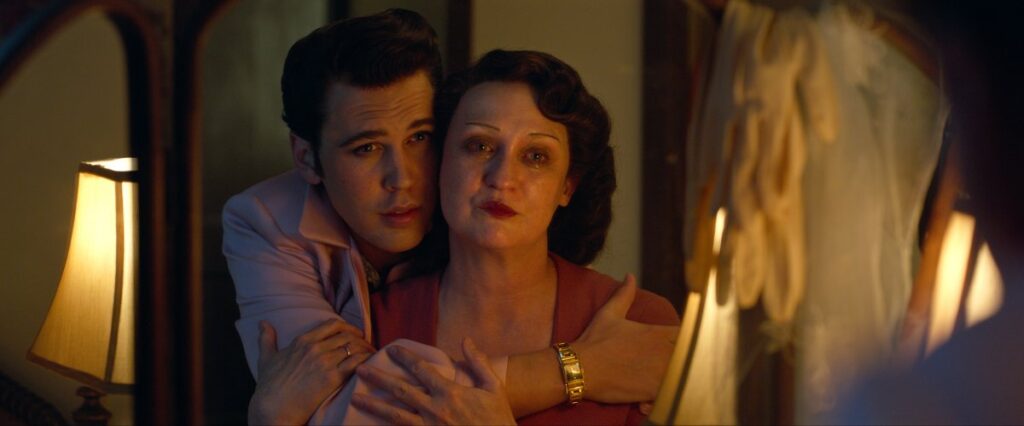Another version of the “Elvis” story is here. Our JP gives his thoughts on the latest big screen offering on the performer dubbed the ‘King of Rock and Roll.’
Elvis
Warner Bros. Pictures
MPAA Rating: PG-13 for “substance abuse, strong language, suggestive material and smoking”
- Directed by Baz Luhrmann
- Screenplay by Baz Luhrmann, Sam Bromell, Craig Pearce, Jeremy Doner
- Story by Baz Luhrmann, Jeremy Doner
- Produced by Baz Luhrmann, Gail Berman, Catherine Martin, Patrick McCormick, Schuyler Weiss
- Starring Austin Butler, Tom Hanks, Helen Thomson, Richard Roxburgh, Olivia DeJonge
Studio Synopsis:
ELVIS is an epic, big-screen spectacle from Warner Bros. Pictures and visionary, Oscar-nominated filmmaker Baz Luhrmann that explores the life and music of Elvis Presley, starring Austin Butler and Oscar winner Tom Hanks. A thoroughly cinematic drama, Elvis’s (Butler) story is seen through the prism of his complicated relationship with his enigmatic manager, Colonel Tom Parker (Hanks). As told by Parker, the film delves into the complex dynamic between the two spanning over 20 years, from Presley’s rise to fame to his unprecedented stardom, against the backdrop of the evolving cultural landscape and loss of innocence in America. Central to that journey is one of the significant and influential people in Elvis’s life, Priscilla Presley (Olivia DeJonge).

JP’s Take:
Legendary rock star Elvis Presley is an American icon, who is known worldwide and is one of the top selling solo artists of his day. Alongside Michael Jackson, he most likely still holds that title to this day. Despite my knowledge of him, I didn’t know him in depth and when it comes to the life and times of such a major figure, I wanted to dive deeper into his backstory. Subtitled TCB (Taking Care of Business), “Elvis” is a film several years in the making.

Remembering his previous successful adaptations like “Strictly Ballroom,” “Romeo + Juliet,” “The Great Gatsby,” and “Moulin Rouge,” this latest movie has Baz Luhrmann’s name written all over it, as he serves as director, co-writer and co-producer. Call it a fantasy, musical, drama, or biopic, what you’ll witness is a feature that bears Luhrmann’s signature genre blending methods that are working together to bring us a dazzling and enlightened account.
My introduction to Elvis has all been surface based. I’ve heard his music, learned about his career, and even seen some of his movies. This man’s life has been played out on the small screen, too, in documentaries and a couple TV biopics, including one in particular starring Kurt Russell in the similarly titled “Elvis,” a 1979 TV movie directed by John Carpenter. Yet, none have been done in such an uncanny way as Austin Butler’s titular portrayal in this 2022 film.
Here we learn of a young white southern boy from rural Tennessee, whose love for black music sparked his pursuit of a musical career. However, there’s more to his life than meets the eye. This is Elvis, the hot commodity, the sexy symbol, Elvis the cash cow, and Elvis the indentured servant to a man who also stood to gain quite a bit from Elvis’ career. Colonel Tom Parker (Tom Hanks) opens the movie while he recounts the moments he met young Presley and how he launched him to stardom.
Much of the film is told through the eyes of Col. Parker. What an inspiring tapestry Luhrmann weaves: knitting not only a tale of Elvis’ musicianship, but of his humanitarian side as well. What was not fully known to me is how steeped Elvis Presley was in black music, such as blues and gospel. There is a moment where we witness him peering into an African-American tiny church and becoming enraptured by the sounds of negro spirituals and, while in the same scene, he sneaks over to a broken down juke joint where a blues guitarist is singing his heart out. This sparked such a fire in him that he could not hold it in. His affection for the musical stylings of black artists led him to enter singing contests and talent shows later on as a teenager. However, we also learn that the road to stardom wasn’t always paved with gold.

To my elation, Luhrmann does a fine job of bridging the gap between the African-American musicians who helped shape Elvis Presley’s career path and that of him being an American icon. He does this by showing how much respect Presley has for his influencers, especially at a time when black artists were not recognized or even given praise for their contributions. Moments with Elvis and rhythm & blues singer Willie Mae “Big Mama” Thornton (Shonka Dukureh) playing off each other in song ignited a bit of fireworks between the two of them. Then, there is a time he watched a very young rock n roller Richard Wayne “Little Richard” Penniman (Alton Mason) performed that gave him even more inspiration, as well as how he and the young B.B. King (Kelvin Harrison Jr.) became friends. Moreover, Elvis is quoted in an interview that Antoine Dominique “Fats” Domino is his hero, a real king of rock n roll. It is those homage paying interludes that present Presley’s true nature.

Midway through the film, we begin to see both his career and personal life start to unravel. There is a proverbial wrestling match with his longtime friend and promoter Col. Parker over the direction in which to steer Elvis’ calling vs. how Elvis was naturally evolving. Elvis is also the subject of underhanded dealings. Unbeknownst to Presley, he pawns himself off to a seemingly benevolent Col. Tom Parker, whose real name and identity is shrouded. This, of course, affected his marriage to Priscilla Presley (Olivia DeJonge) and drove Elvis himself to his breaking point. In the film, Elvis is also portrayed as a humanitarian as well. The deaths of Martin Luther King, brothers John F. Kennedy and Robert Kennedy, and his idol Mahalia Jackson (Cle Morgan) disturbed him deeply, which prompted him to write and perform a protest song during his 1968 Comeback Special. Presley needed to find his own way of bringing people together for the common good and that was through his music.
Although us viewers were disheartened to learn of the tragic turn of events leading up to Elvis’ death, we gained knowledge of the fight he put up. Not just to save his career, Elvis exposed the wrongdoings of others around him, as well as the country’s shifting viewpoint on race relations. Luhrmann presents all this in a tightly-packaged and well played event.
Luhrmann not only tells his story in a fairytale fashion, but he intercuts actual footage from some of Elvis Presley’s most famed moments, which are woven together seamlessly. In addition, this film also tries to dispel is that Elvis was just another white man capitalizing off of the backs of African-American culture and art. It also gives us a glimpse as to the true nature of Col. Tom Parker. Was he an opportunist or a genuine benefactor? Or was he, too, a pawn?
The soundtrack consisted of strings of Elvis’ most famed songs that are sprinkled throughout different scenes and accenting each time period in which they were created. Some songs played hauntingly in the background, while few tracks are given a modern twist. And, of course, you’ll hear the distinct sounds of well-known black artists to give you a reference point.

A big round of applause for Tom Hanks, who disappears into his role as Colonel Tom Parker, who we now know as Andreas Cornelis van Kuijk, a Dutch entrepreneur and former carnival worker. Hanks certainly has the chops to fulfill this role and it may be one of his most challenging ones yet.
Austin Butler is Elvis. If you don’t come out of the theater feeling like he’s done Mr. Presley justice, you’re watching the wrong movie.
Supporting cast all chime in, in just the right way, to help flesh out the atmosphere, including Helen Thomson and Richard Roxburgh in the roles of Gladys and Vernon Presley, Elvis’ loving parents; Kelvin Harrison Jr. as the coolheaded B.B. King; and Olivia DeJonge playing Presley’s devoted wife Priscilla Presley. There are so many others in the cast that their performances are outstanding.
The take away here is “Elvis” is a satisfying fantastical ride through the rollercoaster rise and fall of one of America’s major idols. One in which I honestly can say I enjoyed. For those of you who grew up in that era and witnessed the life of Elvis Presley unfold, this film may be an eye opening experience as well. While you may come out of the theater wanting to learn more about the musicians that influenced Elvis, I was quite surprised and even enlightened to learn about the man behind the “King of Rock and Roll” legend.
